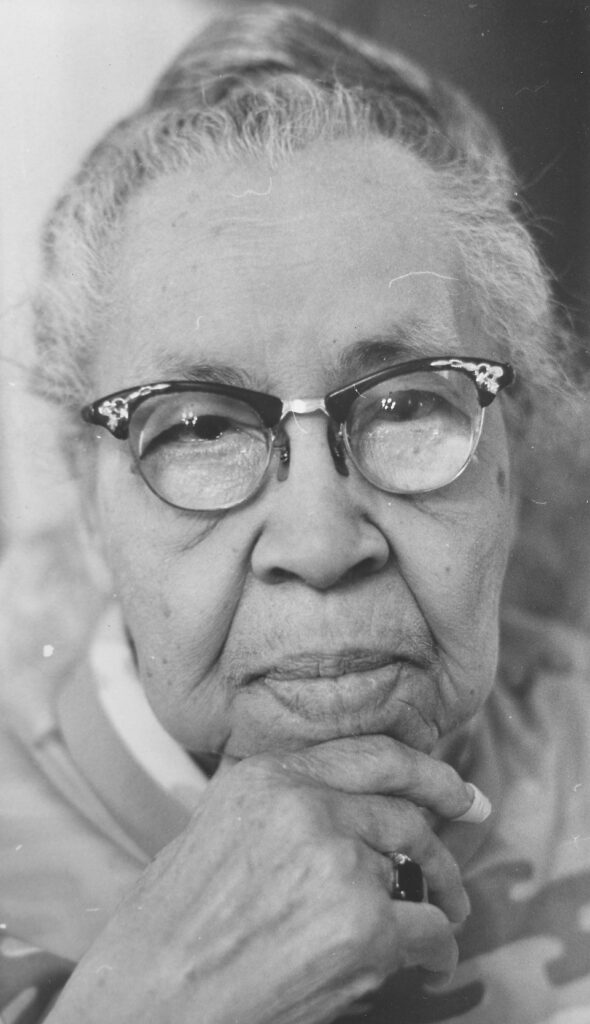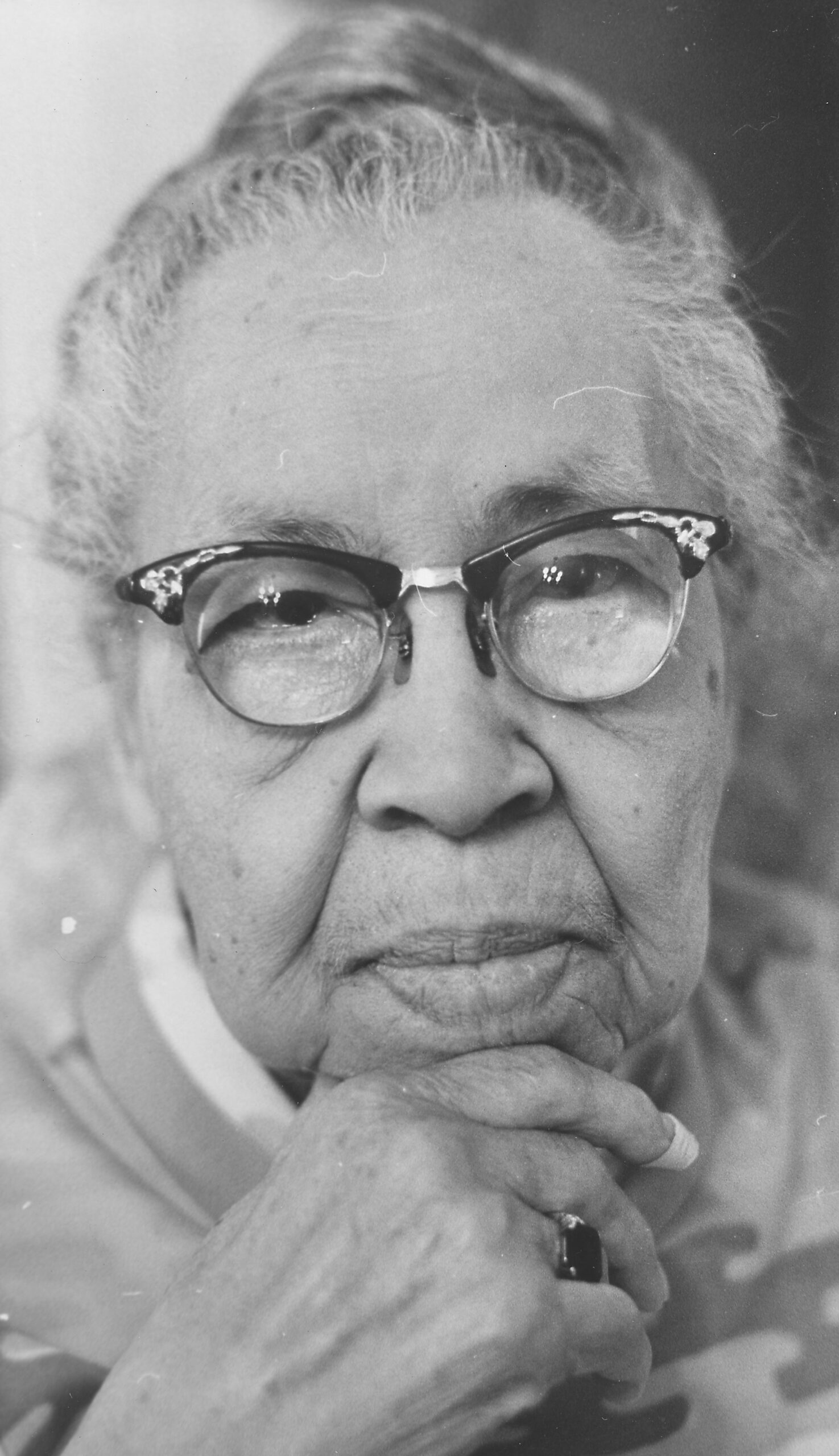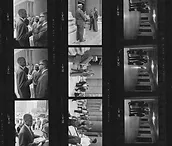Photo by Afro American Newspapers/Gado/Getty Images
In his 1903 essay “The Training of Negroes for Social Power,” W. E. B. Du Bois defined the “Talented Tenth” as the one in ten Black people who had obtained a college degree. Du Bois argued that African Americans’ pursuit of higher education would be the answer to uplifting the race and the tool with which African Americans would combat pervasive Jim Crow violence and racism broadly.
Higher education helped create an African American middle and professional class: doctors, lawyers, politicians, teachers, and entrepreneurs. This new class defined the Black elite in America, and Norma Elizabeth Boyd (seen in this photo at age 91) exemplified this ethic.
Born August 9, 1888, in Washington, D.C., Boyd was the middle child of Pattie and Jurrell Boyd. She graduated from Armstrong High School, a segregated public school, in 1906 and earned a Bachelor of Arts from Howard University in 1910. Boyd completed graduate coursework in education and public relations; she would earn an honorary doctorate from Bowie State College, Maryland, in 1978.
While at Howard, Boyd helped found Alpha Kappa Alpha Sorority, Inc. (A.K.A.), the first Greek-lettered collegiate sorority for African American women, on January 15, 1908. Five years later, she helped incorporate the sorority.
The Black fraternity movement had been ushered in by Sigma Pi Phi Fraternity, the first fraternity founded by African Americans. Established in Philadelphia in 1904, the organization was known as “The Grand Boule.” While membership in The Grand Boule was restricted to Black male businessmen and professionals, the new Black-Greek-Letter-Organizations (BGLOs) were dedicated to African American college students.
BGLOs, affectionately known as The Divine Nine, represent the pioneer nine fraternity and sorority organizations (including A.K.A.) founded between 1906 and 1963. These organizations were established on principles of brotherhood, sisterhood, community service, and race pride.
Boyd also had a deep commitment to service and social action. In 1938, she was the founding director of A.K.A.’s National Non-Partisan Council of Public Affairs, the first National Pan-Hellenic Council and Black sorority lobbying group representing minority concerns to the United States Congress. In addition, she lobbied to expand the Public Works Program, to pass the American Youth Act, and to expand the minimum wage for women working in the laundry industry.
In 1947, Boyd received the “Outstanding Woman of the Year in the Field of Legislation” award from the National Council of Negro Women. The following year, she received an award from the American Council on Human Rights for her national and international activism.
After a 22-year hiatus from sorority and public life, Boyd became active again in the 1970s. In 1980, A.K.A. sorority published Boyd’s autobiography A Love that Equals My Labors: The Life Story of Norma E. Boyd to mark her long-held commitment to service.
The headline of a Washington Post profile of Boyd to mark the 75th anniversary of A.K.A. captured the essence of her life: “Pioneer’s Crusade Goes On.” It noted her “crusade[s] for social and political reform over the last 76 years.”

This portrait of Boyd was taken in 1981 and she remained active until her death on March 14, 1985.
“It was beginning to seem as though the American [D]ream of freedom and equality was continually being deferred,” she wrote. “[M]y sister and I started questioning whether we would actually have the experience of ever living in a land where man and woman is truly free.”
Boyd’s analysis of the American Dream begins with an epigraph of Langston Hughes’s poem “Let America be America Again” in which he calls for America to live up to its true meaning of equality for all people who believe in the freedom to enact their own destinies. Boyd questioned, as did Hughes, whether America endeavored to include African Americans in this dreaming.
Today, Norma Elizabeth Boyd’s legacy lives on as her likeness is displayed in the Smithsonian’s National Museum of African American History and Culture, in ongoing travel exhibits made and funded by A.K.A., and in the hearts of many women of African descent who are impacted by the connection of service and sisterhood.
One of those is Vice President Kamala D. Harris, a 1986 initiate of the Alpha chapter of Alpha Kappa Alpha Sorority, Inc. Boyd’s autobiography currently sits in her office.

Learn more:
Boyd, Norma E. A Love that Equals My Labors: The Life Story of Norma E. Boyd. Alpha Kappa Alpha Sorority, Inc., 1980.
Du Bois, W. E. B. The Training of Negroes for Social Power. 1903. The Oxford W.E.B. DuBois Reader, edited By Eric J. Sundquist. Oxford UP, 1996, 354-362.
Evans, Stephanie Y. “The Vision of Virtuous Women: The Twenty Pearls of Alpha Kappa Alpha Sorority.” Black Greek-Letter Organizations in the 21st Century: Our Fight Has Just Begun, edited by Gregory S. Parks. UP of Kentucky, 2008, 41-66.
Gaines, Kevin. Uplifting the Race: Black Leadership, Politics, and Culture in the Twentieth Century. U of North Carolina at Chapel Hill P, 1996.
Harris, William H. “The Grand Boule at the Dawn of a New Century: Sigma Pi Phi Fraternity.” African American Fraternities and Sororities: The Legacy and the Vision, edited by Tamara L. Brown, Gregory S. Parks, and Clarenda M. Phillips. UP of Kentucky, 2005, 95-136.
Marriot, Michael. “Pioneer’s Crusade Goes On: Cofounder Sees Growth of Oldest Black Sorority.” The Washington Post, 23 July 1984, p. D5 Col. 1.
McNealey, Earnestine Green. Priceless Pearls: Dimensions of Sisterhood and Service in Alpha Kappa Alpha. Alpha Kappa Alpha Sorority, Inc., 2017.
Parker, Marjorie H. Alpha Kappa Alpha Sorority: Sixty Years of Service. Alpha Kappa Alpha Sorority, Inc., 1966.
—. Alpha Kappa Alpha: In the Eye of the Beholder. Alpha Kappa Alpha Sorority, Inc., 1979





